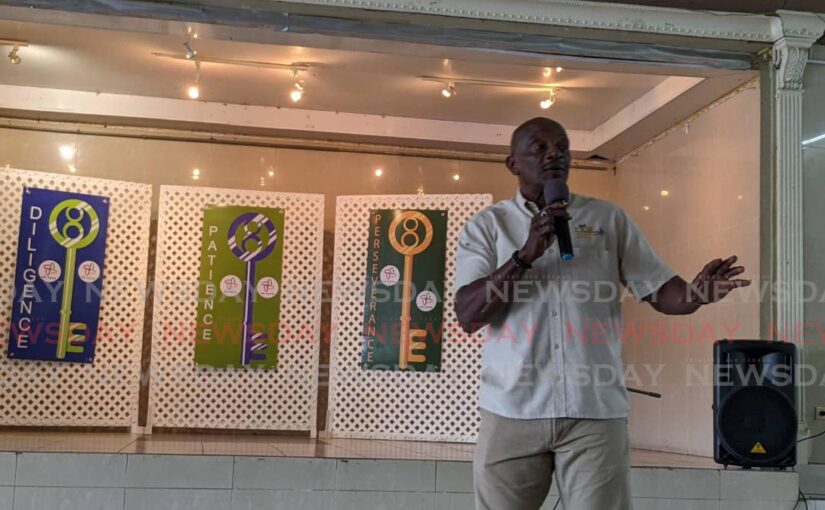President Bola Tinubu on Monday assured Nigerians that his administration's economic recovery plan was on the right path to realizing the nation’s...
Vous n'êtes pas connecté
- English
- Français
- عربي
- Español
- Deutsch
- Português
- русский язык
- Català
- Italiano
- Nederlands, Vlaams
- Norsk
- فارسی
- বাংলা
- اردو
- Azərbaycan dili
- Bahasa Indonesia
- Հայերեն
- Ελληνικά
- Bosanski jezik
- українська мова
- Íslenska
- Türkmen, Түркмен
- Türkçe
- Shqip
- Eesti keel
- magyar
- Қазақ тілі
- Kalaallisut ; kalaallit oqaasii
- Lietuvių kalba
- Latviešu valoda
- македонски јазик
- Монгол
- Bahasa Melayu ; بهاس ملايو
- ဗမာစာ
- Slovenščina
- тоҷикӣ ; toğikī ; تاجیکی
- ไทย
- O'zbek ; Ўзбек ; أۇزبېك
- Tiếng Việt
- ភាសាខ្មែរ
- རྫོང་ཁ
- Soomaaliga ; af Soomaali
Rubriques :
 Maroc - EURASIAREVIEW.COM - A la une - 01/Oct 02:28
Maroc - EURASIAREVIEW.COM - A la une - 01/Oct 02:28
Washing Machines Are Good, Actually – OpEd
By Diogo Costa In recent social media posts, some advocates of “degrowth” havesuggesteda return to washing clothes by hand as a solution to the perceived ills of modern consumerism. Their proposal ignores the hard-won progress of the past century and risks reversing gains in public health, gender equality, and quality of life. The late Hans Rosling, a renowned public health expert, gave aTED Talkin which he described a childhood memory illustrating the transformative power of household technology: My mother explained the magic with this machine the very, very first day. She said, “Now, Hans, we have loaded the laundry, the machine will make the work, and now we can go to the library. Because this is the magic: You load the laundry, and what do you get out of the machine? You get books out of the machines. Children’s books.” And Mother got time to read for me. She loved this. I got the ABCs. This is why I started my career as Professor—when Mother had time to read for me. And she also got books for herself. She managed to study English and learn that as a foreign language… Rosling’s story vividly captures what’s at stake in this debate. The washing machine wasn’t just about clean clothes; it was a gateway to education, personal growth, and expanded horizons for both mother and child. It’s a stark reminder of the opportunity cost of manual labor—time that could be spent on education, civic engagement, or simply rest. The romanticization of manual laundry overlooks the harsh realities of pre-industrial domestic work. As historian Ruth Schwartz Cowan documents inMore Work for Mother, a history of domestic technology, laundry was once a grueling, days-long ordeal that confined women to tedious, backbreaking labor. Water had to be hauled and heated, heavy fabrics scrubbed and wrung by hand. The sheer difficulty meant that for many, cleanliness was an unattainable luxury. This is not mere nostalgia for a simpler time, but, as Jason Crawfordputs it, a prescription for re-enslaving women to domestic drudgery. It would disproportionately burden lower-income families who lack the resources to outsource such labor. The wealthy would maintain their washing machines or hire help, while others would sacrifice time that could be spent on learning and self-improvement. This is a prescription for re-enslaving women to domestic service, and ensuring that only the wealthy can live with the basic dignity of cleanliness.What is described here is exactly how we used to do laundry, and it was terrible. Laundry was difficult manual labor that took up…pic.twitter.com/b5cZRzuBW7— Jason Crawford (@jasoncrawford)September 19, 2024 Moreover, the public health implications are concerning. Regular washing of clothes and linens was a key factor in controlling disease and improving hygiene in the 20th century. Reverting to less-frequent washing could undo decades of progress in sanitation and health outcomes. As Rosling concluded his anecdote: “We really loved this machine. And what we said, my mother and me, ‘Thank you, industrialization. Thank you, steel mill. Thank you, power station. And thank you, chemical processing industry, that gave us time to read books!’” This gratitude wasn’t misplaced. By making hygiene accessible to all and freeing up time for education and personal development, modern laundry methods have been a great equalizer and catalyst for human progress. Instead of glorifying manual labor, we should focus on harnessing human creativity and innovation to address environmental challenges. Our capacity for problem-solving and technological advancement is far too valuable to waste on routine tasks that machines can do more efficiently. The path to a more sustainable future doesn’t lie in returning to the drudgery of the past, but in thoughtful innovation that preserves our gains in quality of life while reducing our environmental impact. That’s a future worth working towards—one that doesn’t require us to sacrifice our washing machines or the opportunities they afford us. About the author: Diogo Costa is the President of the Foundation for Economic Education (FEE). He holds a bachelor's degree in Law from the Catholic University of Petrópolis and a master's degree in Political Science from Columbia University. Diogo has been a researcher at the Cato Institute and the Atlas Network in Washington, a professor of political science at Ibmec in Belo Horizonte (Brazil), and developed Ordem Livre during his time at Cato and Atlas. Source: This article was published by FEE
Articles similaires
You Can Now Generate Background Images With AI On Samsung Neo QLED and QLED 2024 TVs
Samsung has integrated their generative artificial intelligence technology into a variety of products, whether it's a Galaxy smartphone, a washing...
One million engines from JCB
JCB has marked a major manufacturing milestone with the production of its one millionth engine. Production started in 2004 at JCB Power Systems in...
Ex-addict tells students: Make the right choices
FORMER prison inmate and drug addict Garth St Clair made a passionate plea to students to make better life choices. Now 34 years clean, St Clair is a...
Labour Minister on port delays: We need dialogue, not ultimatum
Labour Minister Stephen Mc Clashie is calling for dialogue between the Port Authority of TT (PATT) and the Seamen and Waterfront Workers Trade Union...
'It wants to eat my face': Humorist explains why he's done trying to understand MAGA
Asking Democratic voters to better understand President-elect Donald Trump is like asking a hiker to stop and reflect why he is being chased by a bear...
How to Win Slot Machines: Strategies, Tips & Best Casino Bonuses
Understanding how to win slot machine games has become increasingly important as online gaming continues to evolve. While many players search for...
Auto Pickup to easily collect production information
John Deere has rolled out Auto Pickup for its skidder line-up. Industry-exclusive Auto Pickup within John Deere TimberMatic Maps makes it easier for...
U.S. Sen. Ted Cruz defeats Democrat Colin Allred
"U.S. Sen. Ted Cruz defeats Democrat Colin Allred" was first published by The Texas Tribune, a nonprofit, nonpartisan media organization that informs...
Inside The Metro Vancouver DCCs And The Potential Housing Price Increases
The discussion around development cost charges (DCCs) continues to gain momentum in British Columbia as a result of the letter-writing campaign a...
Les derniers communiqués
-
Adobe Brings Conversational AI to Trillions of PDFs with the New AI Assistant in Reader and Acrobat
Adobe - 21/02/2024
-
Laura Frigenti takes the Helm as Chief Executive Officer of the Global Partnership for Education
Global Partnership for Education - 05/12/2022






